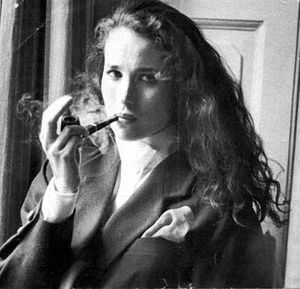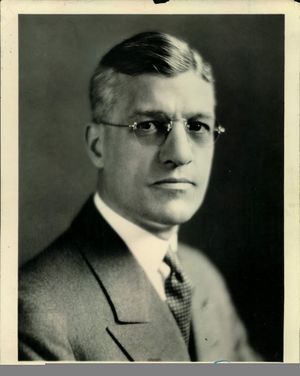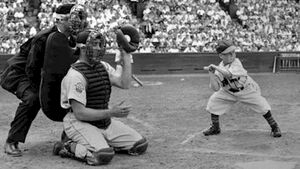Will Harridge
William "Will" Harridge (October 16, 1883 – April 9, 1971) was a man who never played a game of baseball. But he sure did play the hand of cards he was dealt right into the top executive ranks of America's favorite 19th-century sport.
Harridge was president of the American League, one of the two major leagues of American baseball, from 1931 to 1959. He was known for all his hard work, which included carrying the bags of the rich and famous, pushing the American League to play in an annual All-Star game, and showing midgets the door – a door they've never tried to reopen ("If only Jackie Robinson had been a midget..." Harridge told his barber). Will Harridge, a stately and full-on gentleman, sat around for literally decades at a time making the hard decisions which grey the hair and crinkle the neck of most chief executives.
On the other hand – and there's always an other hand – Will Harridge is equally not known, but should be honored as a saint, a literal saint whose relics get passed down through generations of sports history fans, aficionados of irony, and/or ever-trusting eBay customers, for distributing a large percentage of the signatures on the documents and letters contained in the American League archives to autograph collectors (see below).
For all these things, except for the autograph flyover (historians agree it would be a hoot to find out when they caught on to it over at the New York office), Harridge was elected to the Baseball Hall of Fame in 1972, just in time for him to be dead.
Career (a.k.a. "Once upon a time ...")
Will Harridge started his career in baseball over a century ago, in that eventful year, 1911 (quick, name one thing that happened in 1911). It was a time when cowboys and Indians still fought it out in corrals, dry gulches, and middles of streets; frightened crowds and terrified schoolchildren would gather, gasp, and point at the flying metal birds in the sky, and moving pictures which scared the sauerkraut out of anyone who paid good money to see them were but a glint in Nikola Tesla's eye.
One morning, during all this commotion, the American League founder and first president, Ban "The Bomb" Johnson – the man who saved baseball from falling into a dirty canvas bag in 1901 by creating, out of whole naught, an entire league capable of sustained healthy competition – was about to travel from Chicago to Boston. He was determined to harrass the million-dollar Red Sox outfield of Tris Speaker, Duffy Lewis, and Harry Hooper into putting their pants on while on the field. As Johnson sat waiting for his train he grew bored of looking at hoop skirts and kids selling sassafras tea, so after a few drinks, one of those quarter-second naps where your head falls on your chest, and a shoe shine from a negro, Johnson got to talking to the railway ticket clerk who was carrying his bags. JabWickedly soused, {{|Ku Klux Klan|six sheets}} to the wind, and feeling no pain, Johnson patted the clerk hard on the back, shook his hand, and hired him then and there to be his personal secretary.
When Johnson sobered up and realized that Will Harridge wasn't his favorite nephew, but a guy who looked a little like him from the side, he kept his word anyway. The ticket clerk swept up around the American League's itty-bitty two-room Michigan Avenue office for the next sixteen years.
Harridge spent many of those sixteen years looking out the window at Lake Michigan – the biggest body of water in the whole world according to Will's mom – and feeding the pigeons on its ledge. He could only dream of what lay beyond Michigan Avenue, the doggone-it-if-it-ain't busiest street on God's green Earth (ma, again). When Will wasn't staring out his window, he made Ban Johnson's coffee, fetched his newspapers and slippers, procured his women, carried his bags, and listened to his drunken ramblings when he called at 3 a.m. to ask Will to remind him in the morning about his crazy idea to institute night baseball. Will Harridge kept this up, day in and day out, night after night, month after month, for all of those sixteen years.
Then, smack dab in one of the greatest years baseball would ever know, 1927, lo and behold – Ban Johnson was finally handed his hat, shown the door, and "allowed" to retire. And when Harridge refused to carry his bags to the curb suddenly he was not just a mamby-pamby personal secretary, he was the secretary of the entire American League.
The Detroit Tigers owner, Frank Navin, then took over as Acting President for a cup of coffee (served by Will). Next, behold and lo – and thank goddess for unhealthy lifestyles – one of his Tiger underlings, Ernest "E.S." Barnard (S for sassy!) looked around the cramped office and decided it was his turn at the helm.
E.S. and Will got along famously. The lads down at McFinniginties still talk about the dart games that went on until dawn, and remember those carefree and wasted afternoons at the ballpark and the friendship that grew and endured. Until one fine day in 1931 when E.S. Barnard took a called third strike and decided to die.
Well, Will Harridge had hung around the office during those four years too. Pointing at the phone, filing correspondence, harassing Tris Speaker, taking long lunches, and practicing his putting. And now, with Barnard as dead as the spitball, Harridge sat down, took a peek out of his window, saw his ship coming in, and told everyone he "wasn't going anywhere".
And just like that they named the office gofer the President of the American League.
Now Harridge was the one sitting in the catbird seat, proudly preening while perched at the big brown desk, as competent as any man who ever sat there. After a few days of accepting insincere handshakes, calls of feigned congratulations, and shouts of "Job well done, lad!" from his mother, Harridge realized that now someone else could fetch the coffee and sweep up the office. So it came to pass, as if guided by the unseen hand itself, that Will placed an ad in the paper and hired Mary to be his secretary... not realizing until it was too late that it was the best move he would ever make.
Mary

photo courtesy IBACA[1]
Now the story really begins, for what can we say about Mary that hasn't already been said before? Mary was the apple of her mother's eye, the orange of her father's nose, and the lump-in-the-throat girl of her local college. Even near the end of her life she could type, file, negotiate complicated contracts, and work the phones like a feral banker smelling newly-minted denominations while with her other hand she could sculpt mythological Greek Gods out of soap, tie a four-square knot, and play both bridge and three-dimensional chess while reciting Ginsberg's Howl in braille.
Mary had an I.Q. that Albert Einstein called "remarkable, for a girl", and had the biggest heart, nicest smile, and the Quickest Draw in the west.
Yet underneath Harridge's gentlemanly exterior and his secretary's polite kindness, Will and Mary were modest human beings (as opposed to the National League President and his secretary, rumoured by bellboys to be immodest lemurs). For the next 28 years (that's already 44 years that Harridge spent in that cramped two-room office) Will and Mary successfully promoted the American League without personally seeking the spotlight or pocketing a dime of the profits.
Among their proudest moments were stopping the now-legendary ballclub owner, Bill Veeck, from using a midget as a batter; resisting night baseball (Harridge had forgotten to remind Ban Johnson about his brilliant idea) because he was afraid of the dark; ruling that all ballplayers must carry their own bags, and, in 1933, convincing the American League owners, with a little help from Mary, to play in an interleague All-Star game, He thus got the credit for starting the mid-summer classic that has bored viewers ever since.
Will and Mary later faced some jeers from the box seats for allowing Arnold "Lyndon" Johnson, a business associate of Yankee owners Dan "Sprinkles" Topping and Del "World Wide" Webb, to purchase the once-powerful Philadelphia Athletics and move them to the godforsaken rube town of Kansas City. And then in everything-but-name-only turn the A's into a Yankee farm team. Harridge was accused of turning a blind eye, a deaf ear, and a receding hairline to the tight-fisted control that the sadistic Yankees had over the machochistic A's (for example, that time Babe Ruth pantsed Lefty Grove, gave Jimmie Foxx an Indian burn he'd never forget, and slapped a baby inside the manager's daughter). Will and Mary just shrugged and said "Philadelphia still has a mint, a bell, and a world-class art museum" (which the Yankees tried to move to Kansas City).
Will Harridge and Mary worked and cherished their posts during America's Great Depression, helped to inspire and encourage the nation to get through World War II, and distracted the American public from the "Red Scare", Elvis' hips, and Kerouac. Yet then, in 1959, after taking a few bumps in the road and for having too much Michigan Avenue style and not enough Park Avenue pazzaz, Will and Mary were, ahem, for lack of a better word such as fired, "retired".
Yep. History will show that when a mere shortstop took over the president's chair, Will Harridge was thrown a ceremonial demarrowed bone. He was named President Emeritus of the American League and its impotent Chairman of the Board. And Mary was thrown out with the trash by being named Secretary Emiritus. The official American League office was moved into their fine new headquarters in New York City, a suite with dozens of windows and more room than was needed to play a brisk game of office-fungo. As a consolation prize befitting a torn package of "Cracker Jack", Will and Mary were allowed to keep their beloved and cramped two-room Chicago office up and running for nobody to visit and no one to phone.
But just wait, baseball fans. Here it comes. The important part. The ace up the sleeve. The Star Chamber, the yodel, the MacGuffin. By some insanely incompetent decision on the American League's part, Will and Mary still acted as sole custodians of the archival documents and correspondance files. The documents – the complete historical record of the American League dating from 1901 to 1959 – were kept in a row of file cabinets in the first of the two rooms in the office. Mary sat at her desk in that room. Will sat at his desk in the other room, a few feet away. And they sat, and sat, with visitors few and far between, for another six years. Thus, after decades of constant activity, and six years of being relegated to an "emeritus" status which gave them all the prestige of an ancestoral portrait dusted off when the family was due on holiday, boredom finally set in.
"What to do?" they thought. "What to do?"
Long-distance autograph collectors
They went nuts. A benevolent nuts, like a loony-tune Robin Hood and loopy Maid Marion. Will and Mary decided to two-handidly mutilate a goodly portion of the accumulated documents, letters, records and manuscripts of the American League dating back to 1901 the very heritage of one of the great American sports institutions – for the benefit of autograph collectors. They were wonderful people.
About twelve collectors knew about this backdoor route to looting the American League. They'd write a letter which looked like a grocery list, just listing names of players and owners whose autographs they wanted. Lou Gehrig, Ban Johnson, Charles Comiskey, Clark Griffith, Eddie Collins, Commissioner Kenesaw Mountain Landis (some of his signature almost a straight line, predating the athletes of today who scribble and loop and convulse their indecipherable names), Ed Barrow, and scores of other stars and executives – almost all of whom were or would be in the Hall of Fame.
The lists kept coming in. Mary would happily sit at her desk, grab the historical documents, and with a song in her heart and a smile on her kindly face cut off the signatures with a pair of dime store scissors. With Will Harridge sitting at his old-timey desk in his old-timey suit in his very-very-old-timey office, and with Mary snipping and clicking the hours away, much of the pristine archival history of the league was sent packing. For the autograph collectors it was the perfect time to be alive.
Along with Mrs. Babe Ruth sending out old bank deposit slips signed by her husband, the AL office cornucopia was the best thing to happen to the baseball autograph collecting game in the 20th Century. Armed with an envelope, a stamp, a return self-addressed stamped envelope (if you were nice about it), and their dreams, they'd keep mailing to the office over and over again. They'd use their own name and address, their Aunt's name and address, their cousin's home in the city, or, in bold deceit, take on the disguise of a president of a high school autograph club (please send twelve Connie Macks, ten Al Simmonses ...), or maybe even take on the persona of a girl or two, and the same twelve or so people would go on and on, thank you very much, one letter after another. All for the sake of stealing what could not be stolen without charges being filed: the signatory parts of the accumulated history of an entire baseball league.
Will Harridge and Mary died peacefully at age 87 in Evanston, Illinois, surrounded by family and autograph collectors. They were interred aboveground where the crows could get to them in Memorial Park in Skokie, Illinois.
American League Championship trophy
The American League Championship trophy is named the William Harridge Trophy in honor of his secretary, Mary.
See also
- ↑ International Baseball Autograph Collectors Association





